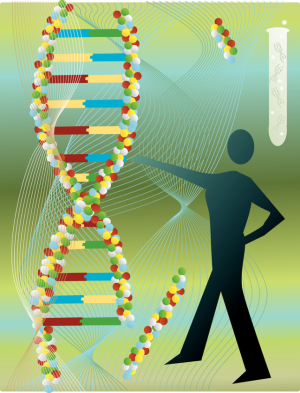Gene Patents Shot Down in Court
by
Brendon Nafziger, DOTmed News Associate Editor | April 02, 2010

A natural substance or
a patentable product?
In a decision that could have far-reaching consequences for biotech companies, a federal court in New York ruled that individual genes isolated from the body were not subject to patent.
On Monday, the New York Southern District Court overturned several patents on breast cancer genes, rattling the industry and putting thousands of gene patents in doubt, although some experts say the immediate aftershocks of the ruling will be mild.
In his ruling, presiding judge Robert W. Sweet struck down intellectual property protections held by the company Myriad Genetics on two genes that they discovered. The judge also struck down patents related to the company's diagnostic method, though he declined to look into the broader question of whether the U.S. Patent and Trademark Office violated the Constitution in issuing the patents.
The genes in dispute, the BRCA1 and BRCA2 genes, are linked with elevated risk for deadly breast and ovarian cancers. Myriad owns the patents to both the genes and expensive tests associated with them, and requires all testing to go through its Salt Lake City, Utah facility.
"The identification of the BRCA1 and BRCA1 gene sequences is unquestionably a valuable scientific achievement for which Myriad deserves recognition, but that is not the same as concluding that it is something for which they are entitled to a patent," Sweet concluded in his judgment.
The American Civil Liberties Union, which was one of the plaintiffs that brought the suit against Myriad, applauded the decision. "The human genome, like the structure of blood, air or water, was discovered, not created. There is an endless amount of information on genes that begs for further discovery, and gene patents put up unacceptable barriers to the free exchange of ideas," ACLU lawyer Chris Hansen said in a statement. The ACLU, which hopes to abolish all patents on genes, says the ruling could jeopardize around 2,000 patents.
The ACLU filed the suit against Myriad last May, and was joined by the Public Patent Foundation as well as women who said they couldn't afford the pricey genetic tests.
The suit also named a University of Utah research foundation affiliated with Myriad and the U.S. patent office as defendants.
Medical groups and charities worried about the effect such patents have in limiting access to potentially life-saving medical treatment, such as the American Medical Association, March of Dimes, and American Society for Human Genetics, filed friend-of-the-court briefs in support of the lawsuit. The suit also attracted activists like the Indigenous Peoples Council on Biocolonialism, which opposes many biological patents.
